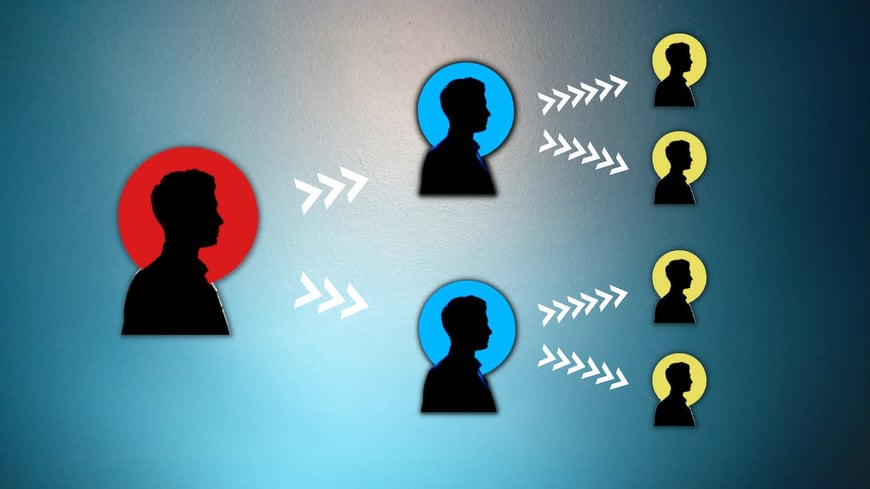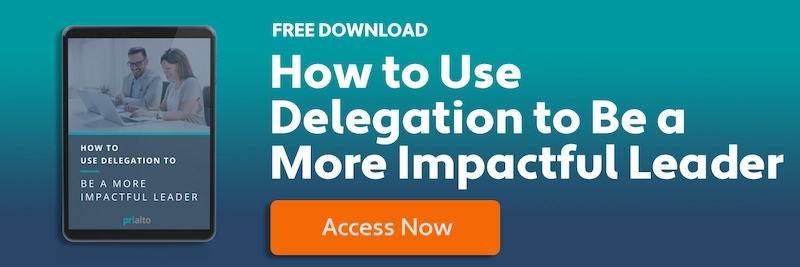No, it is not a new coffee drink, though a bit of caffeine can be an executive’s best friend. MOCHA is a framework to help executives delegate more effectively and efficiently. If you are, like most executives, swamped with busy work (most executives spend 16 hours a week on administrative tasks), it might be time to take a step back and assess what tasks you can (and should) hand off to others.
Delegate or Drown
First, a brief primer on why delegation is critical to productivity and growth. Gallup measures what it calls “delegator talent.” After years of studying business productivity, Gallup’s data shows that executives “who have and use high delegator talent can generate better business growth and venture success than leaders who get lost in the day-to-day minutiae of managing a business.”
How much better are CEOs with high delegator talent? Gallup’s study of Inc. 500 CEOs found that those with high delegator talent, over three years, enjoy these outcomes compared with businesses led by executives with lower delegator talent:
- They grow 112 percent faster
- They generate 33 percent more revenue
- They create more than 30 percent more jobs
Quite simply, if you do not delegate well, you drown in the day-to-day or your business plateaus because it cannot grow beyond the time you can spend juggling everything.
How MOCHA for Delegation Works
Maybe you know this already, but you are struggling with the questions of how, to whom, and what to delegate. That is where MOCHA comes in. It is a framework to clarify responsibilities when delegating tasks. Here is how to break it down:
- Manager: This is you. The manager is the person that assigns responsibility for a task to an owner (see below) and holds the owner accountable. Your role is to make suggestions, ask tough questions, track progress, make sure the owners have all the resources they need to succeed, and step in to help when needed (especially early on).
- Owner: As mentioned, the owner is the primary person responsible for the task. There is no room for ambiguity here. Confusion about ownership usually leads to failure. The owner ensures all the work gets done (directly or with others). There can only be one owner—more than one owner means there is no owner!
- Consultant: Someone consulted is a subject matter expert that will execute the task. Depending on the size of your organization, the owner and the consultant will be the same person. Consultants are often members of adjacent teams with a dotted-line relationship with the owner, with expertise that the owner lacks. A consultant usually has responsibility for quality control or fact-checking.
- Helper: A helper assists with the task but does not have any responsibility for the outcome, performing administrative functions like tracking status and updating team members of status changes.
- Approver: Now we must come back to you. The approver is the person who signs off on projects before they are final. The approver could be you, your supervisor, or a combination of both giving the final approval
MOCHA for Delegation Example: Planning a Business Trip
You might be used to planning your business trips. DIYing your travel makes sense, as travel involves many decisions, and most executives have preferences (and loyalty programs) for airlines, rental cars, and hotels. But then you get into scheduling meetings, finding meeting locations, communicating with the partners and customers you are meeting with, confirming (and often rescheduling) meetings, etc. It is no wonder that planning a business trip takes about 12 hours.
Here is how you might delegate travel planning using MOCHA.
- Manager: You define and document your preferences for airlines, airports, rental cars, hotels, who you want to meet with.
- Owner: The task owner researches all the options for the door-to-door journey, meeting times, and locations.
- Consultant: A consultant, in this case, might be a travel agent or travel and expense software that evaluates the travel plan based on business rules such as cost limits and any favored company providers.
- Helper: A helper might be someone who books the meetings with clients and partners at your destination.
- Approver: You review the final plan and adjust based on your preferences or business needs.
Viola! Instead of taking 12 hours, planning your trip takes about 12 minutes. Documenting your preferences may add time to the process, but you only do that once, and the owner will have that information for future trips.
Gallup found that 75 percent of executives have lower delegator talent. If this describes you, MOCHA can be a great system to use to raise your delegation game and, most importantly, accelerate your business.
Deciding What to Delegate
If you are overwhelmed with busy work, it might be challenging to decide what to delegate to get started. Harvard Business Review recommends using “the 6 Ts” to audit your workload and determine what you can and/or want to hand off to others.
- Tiny: The trivial things that you do yourself because they seem inconsequential. We all know that these can add up to be serious timewasters.
- Tedious: Repetitive tasks with processes you can document and offload to others.
- Time-consuming: Tasks that require some subjectivity but doing the background work eats up hours. Our example above of planning travel is a good example. You can delegate most of the travel planning process and make the final call.
- Teachable: This is self-explanatory. If you can teach someone else to do something on your plate, you should.
- Terrible at: One person’s trash is another’s treasure. If you are bad at something or do not enjoy the task, someone else will love it.
- Time-sensitive: If something needs to be done now but competes with higher priority work and someone else can do it, delegate it.
Are You Ready to MOCHA?
There are all kinds of reasons executives resist delegating. Yes, it takes time upfront to document and train staff in your tasks. Delegation is critical to growing your business and retaining your staff. Employees eager for growth will not stick around if they are not learning and growing. On the other hand, 94 percent of employees told LinkedIn they would stay with a company that offers growth opportunities.

